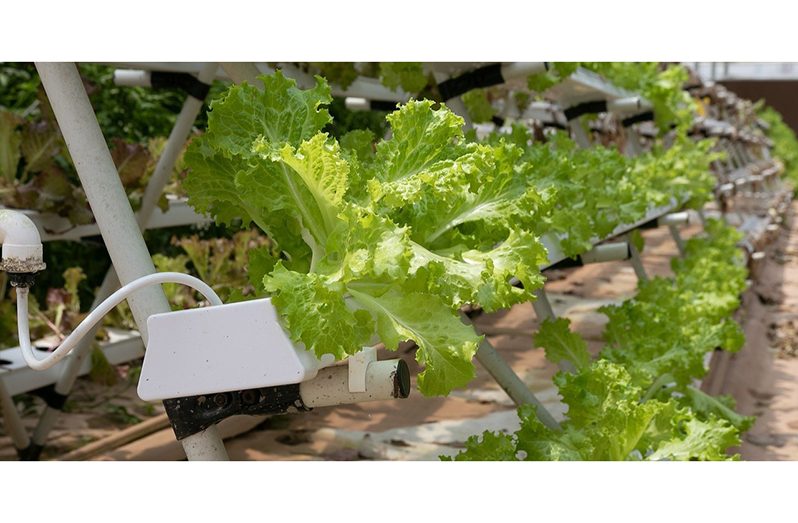-increased allocation for agriculture could expedite Guyana’s regional food-security goals
– private sector stakeholders say
OUTLINING the vision to transform Guyana’s agricultural sector, which has a large-scale farming and food-production industry, a mammoth investment of $97.6 billion has been budgeted for the fiscal package of 2024.
And according to stakeholders, these funds could see the country fast-tracking regional food- security goals, thereby not only increasing the Caribbean’s food production, but also reducing the region’s expenditure on food imports.

Chairman of the Private Sector Commission (PSC), Komal Singh, in an invited comment on Wednesday to the Guyana Chronicle, said, “The more we grow, the less we import.”
Singh added that this year’s national budget, which was presented to the National Assembly on Monday by Senior Finance Minister Dr. Ashni Singh, highlighted several massive advancement plans for the country.
He noted that while investments have been earmarked for the country’s infrastructural and economic development, funds are also present to support the ordinary man.
To provide an illustration, within the agricultural industry, financial resources have been assigned to boost food production, aid farmers, and facilitate additional partnerships with the private sector.
“The budget has catered significantly for tremendous amounts of developments, more for in the agriculture [sic] sector, in agro-processing, and so the food costs will come down.”
A sum of $527.4 million is budgeted to support agro-processing, while $2.6 billion has been allocated to enhance the “other crop” sector by promoting the cultivation of high-value crops such as cauliflower and broccoli.
“When you look at the budget 2024 over all every single sector is that is required to develop a country, an economy and its people is contained in the budget,” Singh said.
He noted that the fiscal package has restored the private sector’s confidence in the government.
“While fuel prices remain high in the world market, the government has continued to subsidise that industry by having absolutely no duty and taxes on fuel imports.”
This particular measure, he says, supports all the major sectors, but particularly for agriculture sector, where companies and suppliers can produce more at a lower cost.
Guyana currently holds the leading position in food security and agriculture within the Caribbean Community (CARICOM), with the shared objective of diminishing the region’s food-import bill of US$6 billion by 25 per cent over the upcoming year.
“When you look at the allocations that was [sic] done again in the agriculture [sic] sector it’s also focused directly on developing and meeting that expectation of a 25 per cent reduction in our food-import bill,” Singh said.

Also sharing some insights, Rasheed Baksh, General Manager at Royal Chicken Inc., a major player in the country’s poultry industry, also said the budgetary allocations for the sector sees the country moving closer to achieving its food-security goals.
Baksh said that one of the major highlights for him and many others in the industry is the maintenance of no taxes on fuel and freight charges.
“Energy cost is a major factor for us in our industry, so we welcome the continuation of that because that will help us with a significant part of our industry and help us to remain competitive…additionally, the reduction of the freight charges, the continuation of that, rather, we have a significant part of our expense in terms of the raw materials we import from overseas, so freight charges and any adjustment there will help in terms of lessening the cost and the cost of production,” Baksh said.
In 2021, the government announced the removal of taxes on fuel, and in this year’s budget, the finance minister said that the zero excise taxes on fuel will be maintained as long as fuel prices remain elevated.
Aside from this, Baksh, who is a member of a local consortium established to produce local feed for livestock, noted that the budgeted funds for the poultry sector will see the country drawing closer to becoming self-sufficient in producing and supplying feed for the regional market.
Plans for enhancing services in the poultry industry by establishing state-of-the-art processing facilities, support facilities, and production zones were revealed during the budget presentation. And these initiatives are expected to be implemented throughout the year, with a projected budget of $1.5 billion.
Moreover, there has been a budgetary allocation of $967.8 million to augment the production of corn and soya bean, specifically for local feed production.
Furthermore, additional, significant investments were outlined to enhance the nation’s drainage and irrigation networks, provide support to farmers, and implement innovative technologies to drive progress in the sector.












